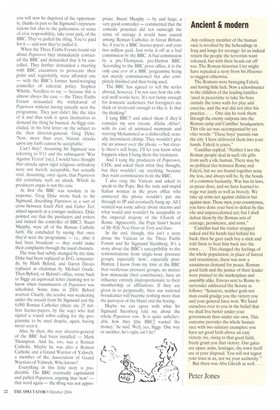Ancient & modern
Any ordinary member of the human race is revolted by the beheadings in Iraq and longs for revenge: let us indeed return the people the terrorists want released, but with their heads cut off too. The Roman historian Livy might have repeated a story from his Histories to suggest otherwise.
The Romans were besieging Falerii, and having little luck. Now a schoolmaster to the children of the leading families 'used in peacetime to take his boys outside the town walls for play and exercise, and the war did not alter his practice. . . . One day he took them through the enemy outposts into the Roman camp and Camillus' headquarters. This vile act was accompanied by yet viler words: "These boys' parents run the city. I have delivered them into your hands. Falerii is yours."
'Camillus replied, "Neither I nor the Roman people deal in such vile gifts from such a vile human. There may be no political ties between Rome and Falerii, but we are bound together none the less, and always will be, by the bonds of a common humanity. War has its laws, as peace does, and we have learned to wage war justly as well as bravely. We take up arms not against children but against men. Those men, your countrymen, you have done your best to defeat by this vile and unprecedented act; but I shall defeat them by the Roman arts of courage, persistence, and arms."
'Camillus had the traitor stripped naked and his hands tied behind his back; then he gave each boy a stick and told them to beat him back into the town. . . . This changed the feelings of the whole population; in place of hatred and resentment, there was now a unanimous demand for peace. Roman good faith and the justice of their leader were praised in the marketplace and assembly alike. Envoys sent to Rome to surrender addressed the Senate as follows: "Senators, neither gods nor man could grudge you the victory you and your general have won. We hand ourselves over to you in the belief that we shall live better under your government than under our own. This outcome provides the whole human race with two salutary examples: you have set good faith above an easy victory; we, rising to that good faith, freely grant you that victory. Our gates are open: arms, hostages, the town itself are at your disposal. You will not regret your trust in us, nor we your authority."
But there was Abu Ghraib as well. . .
Peter Jones


















































































































 Previous page
Previous page